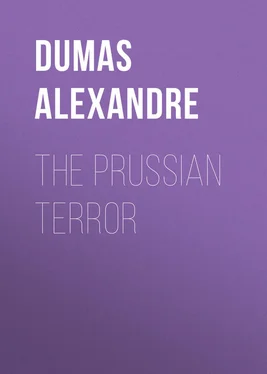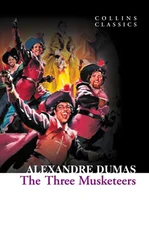Alexandre Dumas - The Prussian Terror
Здесь есть возможность читать онлайн «Alexandre Dumas - The Prussian Terror» — ознакомительный отрывок электронной книги совершенно бесплатно, а после прочтения отрывка купить полную версию. В некоторых случаях можно слушать аудио, скачать через торрент в формате fb2 и присутствует краткое содержание. Жанр: foreign_antique, foreign_prose, на английском языке. Описание произведения, (предисловие) а так же отзывы посетителей доступны на портале библиотеки ЛибКат.
- Название:The Prussian Terror
- Автор:
- Жанр:
- Год:неизвестен
- ISBN:нет данных
- Рейтинг книги:4 / 5. Голосов: 1
-
Избранное:Добавить в избранное
- Отзывы:
-
Ваша оценка:
- 80
- 1
- 2
- 3
- 4
- 5
The Prussian Terror: краткое содержание, описание и аннотация
Предлагаем к чтению аннотацию, описание, краткое содержание или предисловие (зависит от того, что написал сам автор книги «The Prussian Terror»). Если вы не нашли необходимую информацию о книге — напишите в комментариях, мы постараемся отыскать её.
The Prussian Terror — читать онлайн ознакомительный отрывок
Ниже представлен текст книги, разбитый по страницам. Система сохранения места последней прочитанной страницы, позволяет с удобством читать онлайн бесплатно книгу «The Prussian Terror», без необходимости каждый раз заново искать на чём Вы остановились. Поставьте закладку, и сможете в любой момент перейти на страницу, на которой закончили чтение.
Интервал:
Закладка:
Least German of all Germanic states, Prussia is inhabited by a mixture of races. Besides Germans proper, numbers of Slavonians are found there. There are also descendants of the Wends, Letts, Lithuanians, Poles, and other early tribes, and a mixture of Frankish refugees. The prosperity, though not perhaps the grandeur of the House of Hohenzollern, began with Duke Frederic, the greatest usurer of his day. It is as impossible to calculate the enormous sums wrung from the Jews as to narrate the means by which they were extorted. At first a vassal of the Emperor Wenceslaus, when that monarch's impending fall became evident Frederic deserted his camp for that of his rival Otho, and when Otho's crown began to totter, he passed over to Sigismund, brother of Wenceslaus.
In 1400 A.D., the same year in which Charles VI ennobled the goldsmith Raoul, as a reward for financial help, Sigismund, equally embarrassed, borrowed 100,000 florins from Frederic, giving him the Margravate of Brandenburg as security. Fifteen years later, Sigismund having had to provide for the extravagance of the Council of Constance, found himself in debt to Frederic for 400,000 florins. Utterly unable to pay, he sold, or granted in compensation, both the Marches of Brandenburg and the dignity of Elector. In 1701 the electorate rose into a kingdom and the Duke Frederic III became the King Frederic I of Prussia.
The Hohenzollerns display the faults and the characteristics of their race. Their exchequer is admirably managed, but the moral balance-sheet of their administration can rarely be compared with the financial one. They have advanced on the lines of Duke Frederic, with more or less hypocrisy, but with ever-increasing rapacity. Thus in 1525, Albert of Hohenzollern, Grand Master of the Teutonic knights, then lords of Prussia, forsook his faith and became a Lutheran, receiving in return the rank of Hereditary Duke of Prussia, under the over-lordship of Poland. And in 1613, the Elector John Sigismund, wishing to obtain the duchy of Cleves, followed Albert's example and became a Calvinist.
The policy of the Great Elector has been summed up by Leibnitz in a single phrase: "I side with him who pays best." To him is due the formation of the European permanent standing army, and it was his second wife, the famous Dorothea, who started shops and taverns in Berlin for the disposal of her beer and dairy produce. The military genius of the Great Frederic is beyond dispute, but it was he who, in order to curry favour with the Russian Court, offered to "supply" the Grand Dukes with German princesses "at the lowest reasonable rate!" One lady thus "supplied" a princess of Anhalt, is known as "Catherine the Great." We may remark incidentally that he also is chiefly responsible for the partition of Poland, a crime which has weighted the Prussian crown with the malediction of nations, and which he celebrated by this scandalously impious summons to his brother Henry, "Come, let us receive the Eucharist of the body of Poland!" To Frederic also, we owe the economical maxim, "He dines best who eats at another's table!"
Frederic died childless, a fact for which, oddly enough, historians have seen fit to blame him. His nephew and successor, William II, invaded France in 1792. His entry, preceded by the famous manifesto of the Duke of Brunswick, was ostentatious to a degree, but his departure, accompanied by Danton and Dumouriez, was accomplished without sound of trumpet or drum.
He was succeeded by the "Man of Jena," Frederic William III. Among the numerous stupid, and servile letters received by the Emperor Napoleon in the days of his prosperity, must be counted those of William III.
Frederic William IV – we are rapidly approaching our own times – came to the throne in June 1840. According to the Hohenzollern custom his first ministry was a liberal one and on his accession he remarked to Alexander von Humboldt:
"As a noble I am the first gentleman in the kingdom; as a king I am only the first citizen."
Charles X had said much the same on succeeding to the crown of France, or, rather, M. de Martignac had said it for him.
The first proof the king gave of his liberalism was an attempt to drill properly the intellectual forces of the kingdom, which duty he entrusted to the Minister Eichhorn. The name – it means "squirrel" – was quite prophetic. At the end of ten years the project had not advanced a step, although the minister himself had done wonders of perpetual revolution. On the other hand reaction had progressed. The press was persecuted, promotion and rewards were obtained only by hypocrites and informers. High office could only be acquired by becoming a servile instrument of the pietistic party, which was headed by the king.
Frederic William and King Louis of Bavaria were the two most literary of contemporary sovereigns. But Louis encouraged Art under whatever form it appeared, whereas Frederic William wished it to be drilled into a sort of auxiliary to despotism. Feeling himself constrained, like our great satirist Boileau, to give an example of good manners to both court and city, he began a correspondence with Louis, in the course of which he sent the latter a quatrain commenting on the scandal caused by his intimacy with Lola Montes. The King of Bavaria replied in another which made the round of all the courts of Europe.
"Contempteur de l'amour, dont adore l'ivresse,
Frère, tu dis que, roi sans pudeur, sans vertu,
Je garde à tort Lola, ma fille enchanteresse.
Je te l'enverrai bien. – Oui; mais qu'en ferais-tu?"
And, by general consent of the wits, the laugh remained on the side of the versatile King Louis.
After six years of domiciliary visits, suppressions, and summary expulsions of offending journalists, the Prussian Diet at length assembled at Berlin. In his opening speech the king addressed the deputies thus:
"Recollect, gentlemen, that you are here to represent the interests of the people, but not their sentiments ."
A little later in the year, Frederic William inaugurated his Divine Right by observing as he tore up the Constitution:
"I shall not allow a scrap of paper to stand between my people and their God!" meaning, though he did not dare to say it, "between my people and me."
Then the revolution of 1848 burst forth, and did not spare Berlin, which was soon in full revolt. The king lost his head completely. In leaving the town he had to drive past the dead bodies of rioters killed in the struggle. There was a shout of "Hats off!" and the king was obliged to remain uncovered while the people sang the famous hymn composed by the Great Electress.
"Jesus, my Redeemer lives."
Every one knows how Absolutism succeeded in dominating the National Assembly, and how presently reaction brought the following leaders into power:
Manteuffel, whose policy led to the unfortunate Austrian triumph at Olmutz.
Westphalen, who revived provincial councils, and brought the king to the famous Warsaw interview.
Statel, a converted Jew and Protestant Jesuit, a Grand Inquisitor who had missed his vocation.
And, lastly, the two Gerlachs, intriguers of the first water, whose history belongs to that of the two spies, Ladunberg and Techen.
Although the Constitution, establishing two Chambers, was sworn to by William IV, February 6th, 1850, it was not until his successor, William Louis, was on the throne that both Upper and Lower Chambers began to legislate.
A league was now formed by the bureaucracy, the orthodox clergy, the provincial squirearchy, and some of the proletariat. This was the origin of the famous association inappropriately designated the Patriotic Association, which had for its aim the annihilation of the Constitution.
There now appeared as First President of the Association at Königsberg, the Count von Bismarck, who has played so great a part in Prussian history. We cannot do less for him than we have done for the Hohenzollerns, that is to say, we must devote an entire chapter to him and to the Prussia of to-day. For is not the Count von Bismarck a much greater monarch than the King of Prussia himself?
Читать дальшеИнтервал:
Закладка:
Похожие книги на «The Prussian Terror»
Представляем Вашему вниманию похожие книги на «The Prussian Terror» списком для выбора. Мы отобрали схожую по названию и смыслу литературу в надежде предоставить читателям больше вариантов отыскать новые, интересные, ещё непрочитанные произведения.
Обсуждение, отзывы о книге «The Prussian Terror» и просто собственные мнения читателей. Оставьте ваши комментарии, напишите, что Вы думаете о произведении, его смысле или главных героях. Укажите что конкретно понравилось, а что нет, и почему Вы так считаете.












